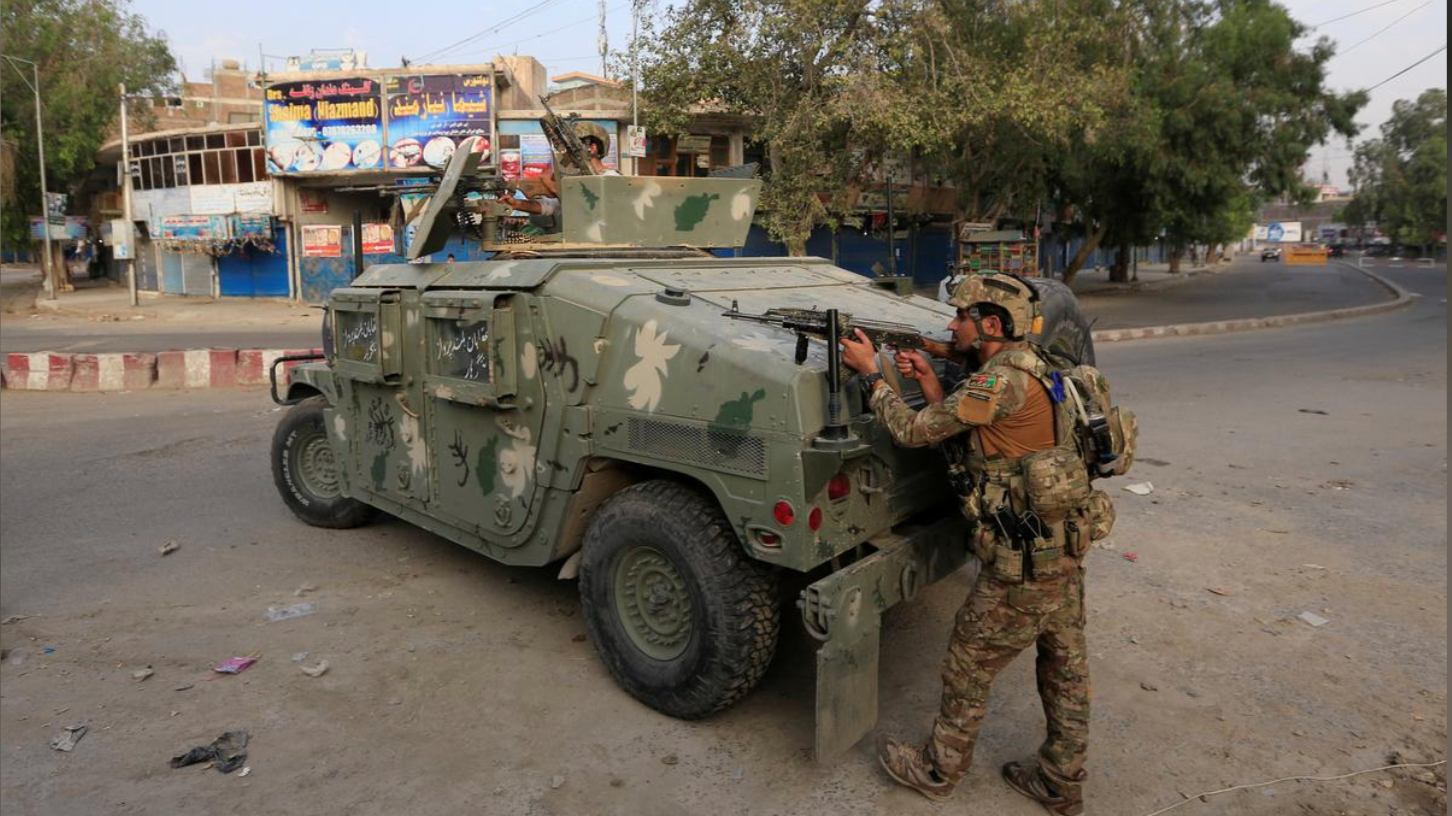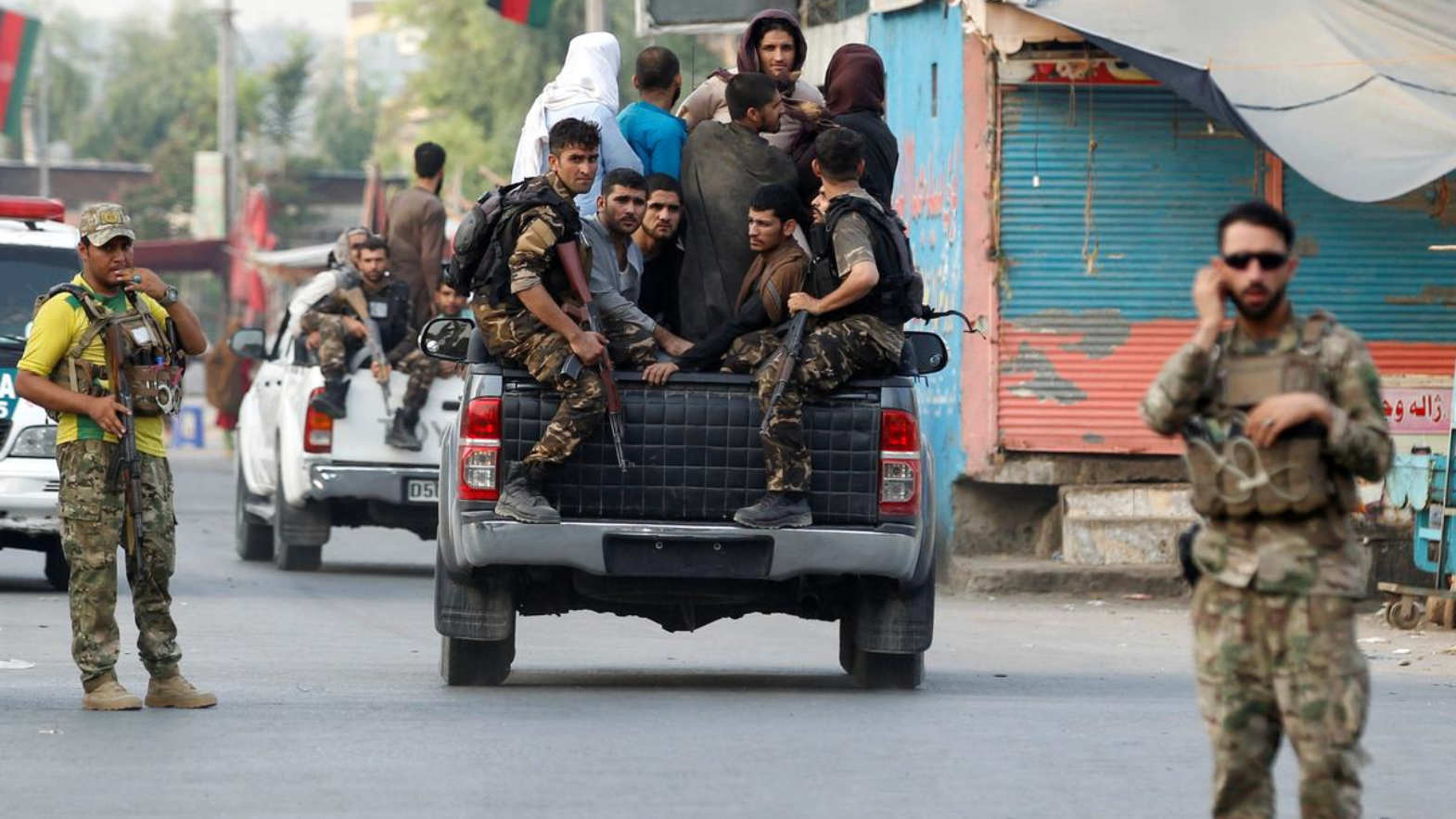
Afghan security forces keep watch near the site of an attack on a jail compound in Jalalabad, Afghanistan, August 3, 2020. /Reuters
Afghan security forces keep watch near the site of an attack on a jail compound in Jalalabad, Afghanistan, August 3, 2020. /Reuters
Editor's note: Hamzah Rifaat Hussain is a former visiting fellow at the Stimson Center in Washington, and currently serves as assistant researcher at the Islamabad Policy Research Institute (IPRI) in Pakistan. The article reflects the author's opinions and not necessarily the views of CGTN.
Afghanistan continues to descend into chaos, with the most recent jailbreak resulting in 24 security forces dying at the hands of ISIL militants on Monday. This event took place amid a fiery gun battle between ISIL forces and Afghan security forces at a prison which houses close to 2,000 inmates. This recent spike in violence bodes ill for the Afghan peace process, after the Taliban announced a ceasefire in Eid while also hinting at how the Intra-Afghan dialogue initially sanctioned under the Trump-Afghan peace deal of 2020 is clouded by violence and continues to be a mile away.
The central equation of the Trump formula in the February 2020 peace deal on Afghanistan was the early commencement of peace talks, which have so far not materialized as several issues centering on prisoner swaps, the constitutionality of the Taliban's demands, their role in any future electoral process and security arrangements have not been addressed.
The more worrying issue, however, is the fact the peace deal made a case for U.S. disengagement from internal Afghan politics by the Trump administration, which has resulted in the inability to address palpable security threats from groups such as ISIL. ISIL's growing potency has meant that a swift response in the form of the earliest commencement of peace talks needs to materialize, which has not been the case, resulting in Afghan security personnel, government institutions and civilians having to bear the brunt of violence in the absence of a tenable solution.
While Trump's policy toward Afghanistan is based on detachment from Afghan internal affairs, that fact that the U.S. had adopted an interventionist approach in the country since 2001, gives it a moral compulsion to protect ordinary Afghans.
Clause one of the peace deal mentions how guarantees would be provided by the Taliban that Afghan soil will not be used against the United States or its allies. These guarantees are overshadowed by how a non-NATO U.S. ally such as Pakistan, which continues to be impacted by cross-border terrorism emanating from Afghanistan, now confronts ISIL on its Western border. There are no guarantees that ISIL will refrain from attacking localities within Pakistan, which is a country that has rendered numerous sacrifices in the war on terror.
Similarly, part three of the peace deal focuses on the United States seeking economic cooperation for the reconstruction of the Afghan state, which is subject to the success of the intra-Afghan dialogue process and negotiations. The latter has not materialized and the former is being stymied by persistent insurgent attacks from the Taliban and ISIL, which has damaged critical infrastructure and wreaked havoc on internal stability. Pressure to have all Afghan stakeholders implement the letter and spirit of the Doha Peace Deal of 2020 has also been absent from the Trump administration, hinting at a lack of commitment toward ensuring that the follow-up clauses that were agreed upon are implemented.

Afghan security forces transport detained prisoners who escaped from a jail after insurgents attacked a jail compound in Jalalabad, Afghanistan, August 3, 2020. /Reuters
Afghan security forces transport detained prisoners who escaped from a jail after insurgents attacked a jail compound in Jalalabad, Afghanistan, August 3, 2020. /Reuters
The Trump formula has been questioned domestically in the United States as well. The Council on Foreign Relations has termed the Trump-initiated peace deal with the Taliban to be a "failure" with significant challenges centering on political power sharing, the role of Islam and the status of women's rights as lingering issues. Eight days after the analysis was published on the Center for Preventive Action, a guest blogger for "Strength Through Peace," termed the status quo in Afghanistan as equivalent to a "false promise."
However, there is reason for cautious optimism given the recent decision of the Taliban to announce a three-day ceasefire over Eid in late July, possibly resuscitating the stalled negotiations. In addition, the Afghan government had pledged to complete the release of 5,000 Taliban prisoners as a precondition for the talks to commence. However, the threat of ISIL and a spike in casualties has meant that observers need to tread with caution as the internal dialogue process is still subject to delays, which is largely attributed to the Trump administration's myopic vision on curbing violence in the country.
Afghanistan's quagmire also demonstrates that Washington D.C. is detached from regional security implications given that the decision to withdraw U.S. troops amid a surge in ISIL attacks will have an impact on neighboring states such as China and Russia in the region. ISIL is a pan-Islamic, transnational organization with the objective of establishing a global caliphate that is not limited to any geographical location.
The group has sought greater legitimacy following a blow to its rank and file after the death of its commander, Abu Bakar Al Baghdadi, in 2019. Hence, it is pursuing a policy of killing Afghan security forces and civilians while challenging the writ of the Afghan government at the same time. The Trump strategy of withdrawing troops fails to take such variables into account, with the focus solely on fulfilling electoral promises of protecting American soldiers with an eye on the November 2020 elections amid heated domestic criticism. The regional implications of ISIL's rise in Afghanistan are both far reaching and have been largely ignored.
The UN Assistant Mission in Afghanistan has already called for the de-escalation of the conflict in the war-torn country to save lives and facilitate discussions in Qatar. More than 800 civilians were killed or injured in the first six months of 2020, with half of them being attributed to the Taliban by the United Nations Assistance Mission in Afghanistan (UNAMA). It is becoming increasingly evident that the Afghan formula of the Donald Trump administration, which disregards the ISIL threat, is failing both the Afghan people and the region.
(If you want to contribute and have specific expertise, please contact us at opinions@cgtn.com.)